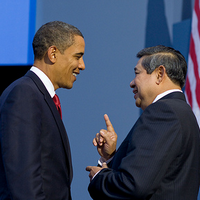JAKARTA, Indonesia -- Before U.S. President Barack Obama's scheduled visit to Indonesia this week was postponed, expectations in both Washington and Jakarta were running at a fever pitch, especially in anticipation of the possible signing of a "Comprehensive Partnership" between the two countries.
On one side, Washington is eager to strengthen relations with Southeast Asia's largest democracy in the face of growing Chinese influence. The fact that Indonesia is home to the world's largest Muslim population also plays into the Obama administration's efforts to further reach out to the Muslim world and improve its global standing. Finally, Indonesia's geostrategic location -- at the center of gravity between the Indian and Pacific Oceans, and controlling the world's busiest maritime trade route at the Malacca Strait -- makes it paramount both for ongoing U.S. military operations in Iraq and Afghanistan and for securing the economic and energy lifeline of U.S. allies and rivals in the region.
For his part, Indonesian President Susilo Bambang Yudhoyono needs a foreign policy triumph to mitigate plummeting public approval ratings and domestic political crises. The visit, now rescheduled for June, could provide Yudhoyono with especially valuable political mileage if it finally removes the U.S. ban on funding and training for Indonesia's Army Special Forces (Kopassus) -- the last "pebble in the shoe" in U.S.-Indonesia defense relations. Of course, expanded American investment and education initiatives wouldn't hurt either.

